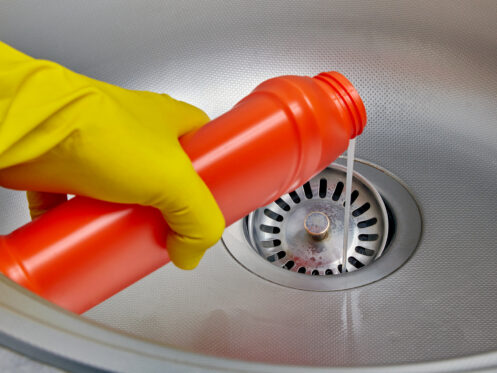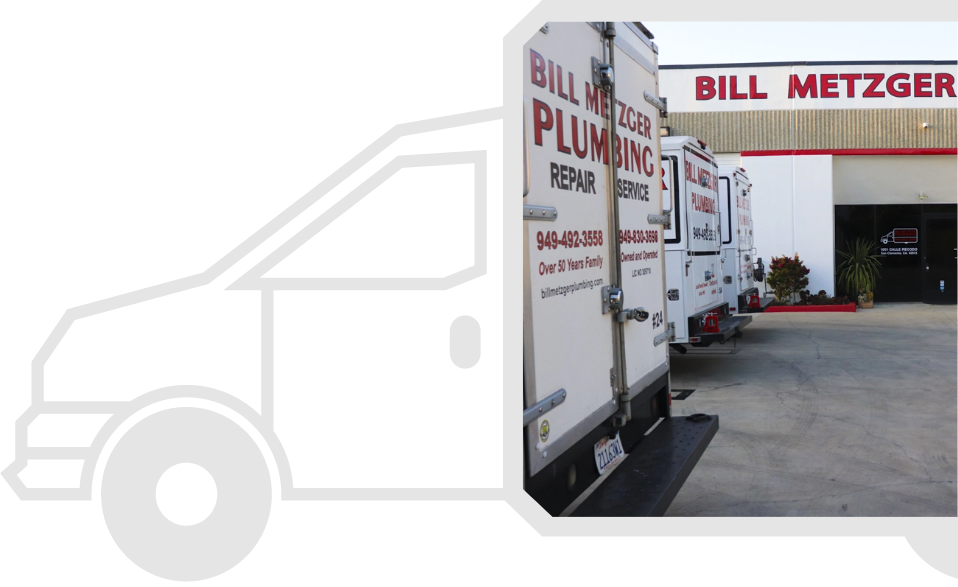Reaching for a chemical drain clear to rectify a clogged pipe seems the easiest rather than contacting a plumbing contractor in San Clemente, CA. Unfortunately, these products can damage your fixtures and your plumbing system. It may cost you more to fix the damage they leave behind than if you had paid a plumber to handle the job. Here is some info about how chemical drain cleaners may damage your home.
What Causes Clogs?
Let’s start by looking at what causes clogs. In the bathroom, soap scum and hair are the most common cause of clogs in the sinks and shower. Product residue adheres to the walls of pipes and builds up, making a perfect platform for a hairball. Toilet clogs are often caused by flushing products not designed for the plumbing system, such as baby wipes and feminine hygiene products. It should be noted that toilet clogs are often farther down the pipes than sink and shower clogs.
In the kitchen, greases and fats commonly cause clogs. Running hot water while pouring grease down the drain does not prevent clogs. As the grease travels down the pipe, it cools and hardens. Food scraps can also clog your kitchen sink, even if you have a garbage disposal. You should avoid putting coffee grounds, leftover food, eggshells, vegetable trimmings, and fruit peels down the drain.
Types of Drain Cleaners
Chemical drain cleaners are available from most hardware and home improvement stores and big box shops. These are usually made with corrosive compounds. You’ll find several different types. It’s critical to never mix different drain cleaners, as this can produce a hazardous gas.
- Acidic drain cleaners
- Caustic cleaners
- Enzymatic cleaners
Acidic drain cleaners often contain sulfuric acid or hydrochloric acid. The idea is that the product will react with the clog and dissolve the material. Some products produce a heat reaction when they come into contact with organic or inorganic materials.
Caustic drain cleaners are similar in that they produce a reaction inside the pipe. They may use sodium hydroxide or lye. You’ll find some liquid products that push the cleaner to the clog where it then dissolves and breaks it down. Powder products often produce hydrogen gas as they work.
Enzymatic drain cleaners are popular with some homeowners because they sound safer. However, they do still cause a chemical reaction that may damage the pipes. Oxidizing cleaners are also available. They pull electrons away from the clog’s source and use them to break down the materials. However, these cleaners can produce a great deal of heat and gas.
Why Are Chemical Drain Cleaners Unsafe?
Using chemicals to clean your pipes and eliminate clogs can be dangerous. Not only can they harm you and your family, but they often damage the pipes, too. Your chance of experiencing pipe damage increases when you use multiple cleaners over the years. Here are some of the dangers that chemical drain cleaners pose.
Personal Injuries
One of the biggest risks associated with chemical drain cleaners is personal injury. Many of these cleaners are strong enough to dissolve skin and tissue when they come into contact with the human body. Use extreme caution when using these products to avoid any contact.
There’s also a risk of breathing problems associated with some drain cleaners, especially when using the cleaner in a space that lacks ventilation. Some experience painful swelling of their skin, redness, and blurred vision when exposed to the hydrogen gas the cleaner produces. It’s also possible to suffer burns from close contact with drain cleaners.
Not for Use in Toilets
Most products come with clear warning labels to not use in the toilet. The plunging action increases the risk of the cleaner coming in contact with the skin. Also, toilet clogs are often farther down the drainage system, where the product won’t reach. Then, if you use it anyway, the build-up of heat and gas can damage the toilet and sewage pipes. Finally, porcelain is susceptible to damage from most chemical drain cleaners, especially if the toilet already has chips or cracks.
Plastic Pipe Damage
Many homes around Orange County have modern plastic or PVC pipes. These pipes are susceptible to damage from chemical cleaners because they produce a lot of heat as they work. The heat can bend, warp, and even break the pipes. Similar problems occur when chemical cleaners come into contact with PEX pipes.
Metal Pipe Damage
Plumbers used metal pipes for many years, including galvanized steel and cast iron. Using chemical drain cleaners in homes with metal pipes can cause corrosion and even dissolve them. Many cleaners use sulfuric acid and similar ingredients strong enough to eat through bone and other hard substances. It takes 24 hours or less for those ingredients to dissolve human bone, which gives you an idea of what they do to metal pipes. Even if the chemicals don’t dissolve the pipes, they can weaken them.
Environmental Impact
In addition to damaging your pipes and loved ones, chemical drain cleaners have a negative impact on the environment. Anything you pour down the drain will eventually find a way out. If you have cracks or gaps in your plumbing system, they create the perfect escape route for the chemicals. They can harm your yard and garden, leaving behind brown and dead spots. There’s also a risk of the chemicals reaching the local water supply.
Other Dangers of Drain Cleaners
Another potential danger is the wear and tear to your sink’s enamel. Enamel is not strong enough to withstand direct contact with most chemicals. Granite and other types of natural stone sinks have a high risk too. Caustic and oxidizing cleaners etch the surface of the stone and leave behind marks that are impossible to remove. Metal and glass sinks are also susceptible to certain products.
While septic tanks aren’t as common in California as they are in other states, homes that have one should avoid chemical cleaners. They affect the tanks the same way they do pipes, causing leaks and possibly dissolving the tank itself.
Another potential risk is damage to your garbage disposal. If you read through the product’s instructions, the maker will often warn against using it in disposal drains. Not only can they corrode or break the appliance, but they usually don’t work on clogs caused by grease and other foods.
Choose Professional Alternatives for Clogged Drains
A clogged drain can range from a minor inconvenience to a major problem, but using chemical drain cleaners will only worsen the issue at hand. The chemical ingredients can affect your breathing, burn your skin, and harm your vision. They cause just as many problems to your plumbing system. When faced with a stubborn clogged drain, you should reach out to a professional plumber in San Clemente, CA.
Call Bill Metzger Plumbing for Clogged Drains
At Bill Metzger Plumbing, you’ll find help with all of your plumbing needs. Our services include drain cleaning services, clog removal, and pipe repairs. We also provide water heater installation, trenchless sewer lines, and water lines. Contact us today to get a better alternative to chemical drain cleaners in Orange County.



 Today
Today 